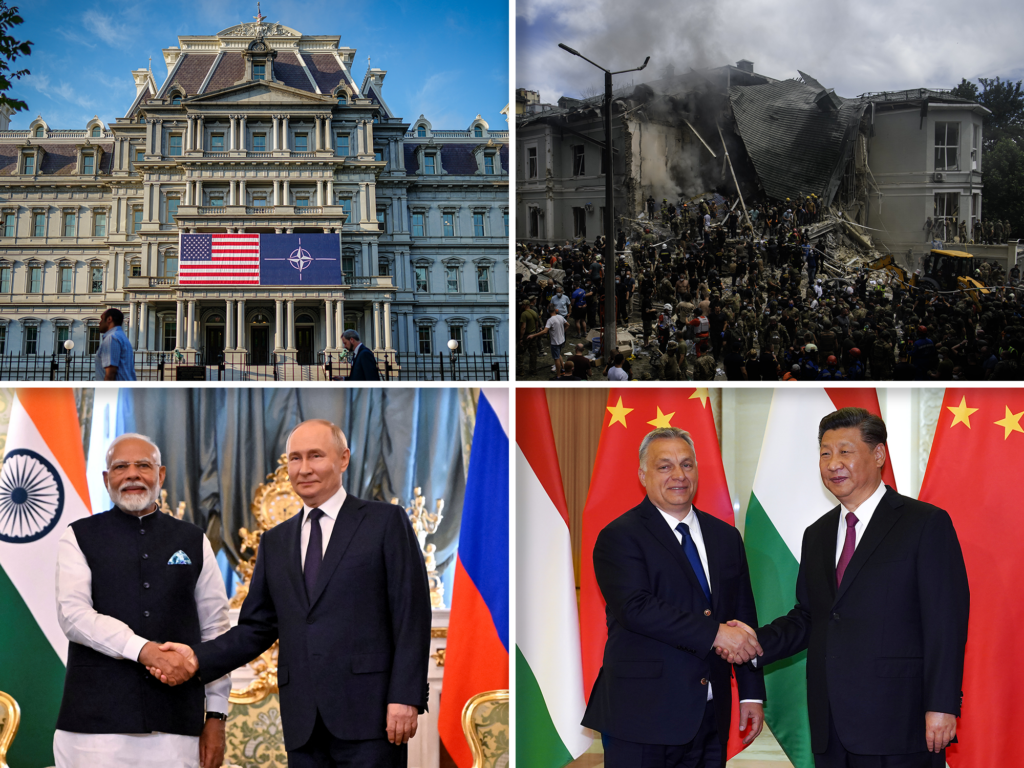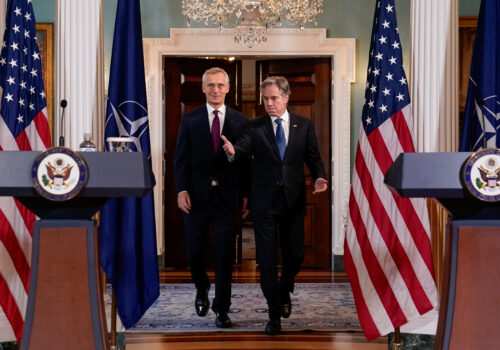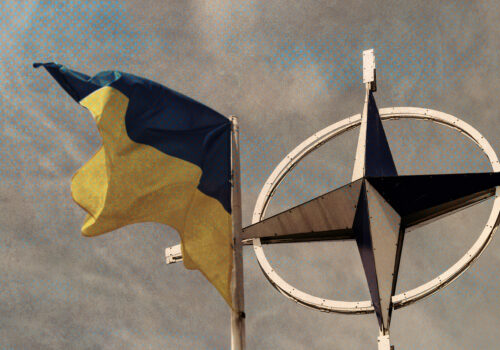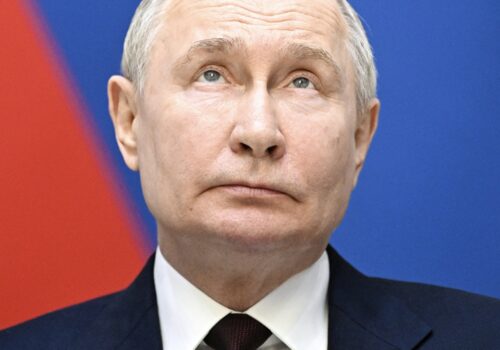The split screen was the devastating work of Vladimir Putin. On one side, a barrage of Russian missile strikes hit Ukraine, and rescue workers search for survivors at Kyiv’s finest children’s hospital. On the other side, heads of state and government arrive in Washington for NATO’s seventy-fifth anniversary summit, the world’s most powerful alliance being shown by Putin as unable to save Ukrainian children.
Another screen shows a NATO leader, Hungarian Prime Minister Viktor Orbán, paying homage to Chinese leader Xi Jinping in Beijing, following his visit with Putin in Moscow. The next screen shows the leader of the world’s most populous democracy, Indian Prime Minister Narendra Modi, making his first visit to Moscow since Putin’s full-scale invasion of Ukraine began in February 2022. Yet another screen shows US President Joe Biden looking lost in his presidential debate, raising new concerns about what his health means for NATO’s future.
No one can convince me it was a coincidence that Putin chose Monday, the eve of the NATO Summit, to launch one of his largest recent barrages of missiles on Ukraine. The leaders of Hungary and India both knew the significance of the timing of their visits—one by the Alliance’s most rogue member and the other by a major power keen to underscore its autonomy of action.
It’s appropriate that today’s opening day for the NATO Summit will be marked by a Ukrainian day of mourning for the at least forty-one individuals who died and the more than 170 who were injured in Monday’s attack, not to mention the wrecked hospital infrastructure that would have saved countless other lives. It seems that Putin hasn’t read Article 18 of the Fourth Geneva Convention, ratified by the United Nations after World War II, which prohibits attacks on civilian hospitals.
Ukrainians’ shock and anger at the strike on the children’s hospital in Kyiv could give way to dismay as they watch NATO stand by in Washington. The United States has not yet fully freed up the Ukrainians to use the longer-range Army Tactical Missile Systems (ATACMS) that could hit the Russian sites from which deadly missiles are fired. NATO allies once again will likely put off a decision about when exactly Ukraine will join the Alliance, which is the only outcome that will provide the country the long-term security its neighbors in the Baltics, Poland, Romania, and Hungary enjoy.
Orbán’s rogue relations with Russia and China come as he takes over the rotating presidency of the Council of the European Union, something Xi acknowledged as an opportunity, just days after the European Union kicked off new tariffs on Chinese electric vehicles. Orbán stopped in Moscow before he flew on to Beijing.
During his visit to Moscow, Modi called Russia an “all-weather friend” and a “trusted ally.” Putin reciprocated the sentiment by welcoming his “dear friend” to his official residence.
Underpinning the Russia-India partnership is energy. India is the third-biggest crude oil importer in the world, and Russia is its single largest source of seaborne oil, accounting for around 40 percent of imports in recent months, up from just 2 percent in 2021.
Modi would have known that choosing to make the trip during the NATO anniversary summit would rub some US officials the wrong way. However, he, like Orbán, knew there will be little price to pay from Western partners after the trip.
NATO began its mission seventy-five years ago amid an inflection point in history, a story former US Secretary of State Dean Acheson chronicled in his memoir Present at the Creation. Putin and Xi would very much like to be present at the conclusion of NATO and the US-led international order. But they will only be successful if allies don’t respond and if partners go out of their way to back these revisionist autocrats.
Frederick Kempe is president and chief executive officer of the Atlantic Council. You can follow him on Twitter: @FredKempe.
This edition is part of Frederick Kempe’s Inflection Points Today newsletter, a column of quick-hit insights on a world in transition. To receive this newsletter throughout the week, sign up here.
Further reading
Mon, Jul 8, 2024
The NATO Summit faces three simultaneous threats
Inflection Points By
Autocracies’ growing common cause, democracies’ continued weaknesses, and an insufficient recognition of the gravity of the historic moment confront the Alliance as it meets in Washington.
Mon, Jun 10, 2024
Building the bridge: How to inject credibility into NATO’s promise of membership for Ukraine
New Atlanticist By Ian Brzezinski
Ukraine’s bridge to NATO membership must be built in ways that institutionalize its integration into the Alliance’s structures—starting now.
Wed, Jun 12, 2024
A Putin summer surprise for NATO? Worries are growing.
Inflection Points By Frederick Kempe
The Russian president likely wants to undercut NATO’s upcoming summit in Washington. The Alliance should ready a surprise of its own.
Image: Passers-by walk past the Eisenhower Building with the US and NATO flags in the early morning. The NATO summit begins with celebrations to mark the 75th anniversary of the defense alliance. (Kay Nietfeld/dpa via Reuters Connect); Rescuers and volunteers are working at Ohmatdyt Children's Hospital that was strongly damaged during a Russian missile strike in Kyiv, Ukraine, on July 08, 2024, amid the Russian invasion. Russia is massively attacking Ukraine with missiles on July 08. (Photo by Maxym Marusenko/NurPhoto); Russia's President Vladimir Putin shakes hands with India's Prime Minister Narendra Modi during a meeting at the Kremlin in Moscow, Russia July 9, 2024. Alexander Nemenov/Pool via REUTERS; Chinese President Xi Jinping shakes hands with Hungarian Prime Minister Viktor Orban before the bilateral meeting of the Second Belt and Road Forum at the Great Hall of the People, in Beijing, China April 25, 2019. Andrea Verdelli/Pool via REUTERS



